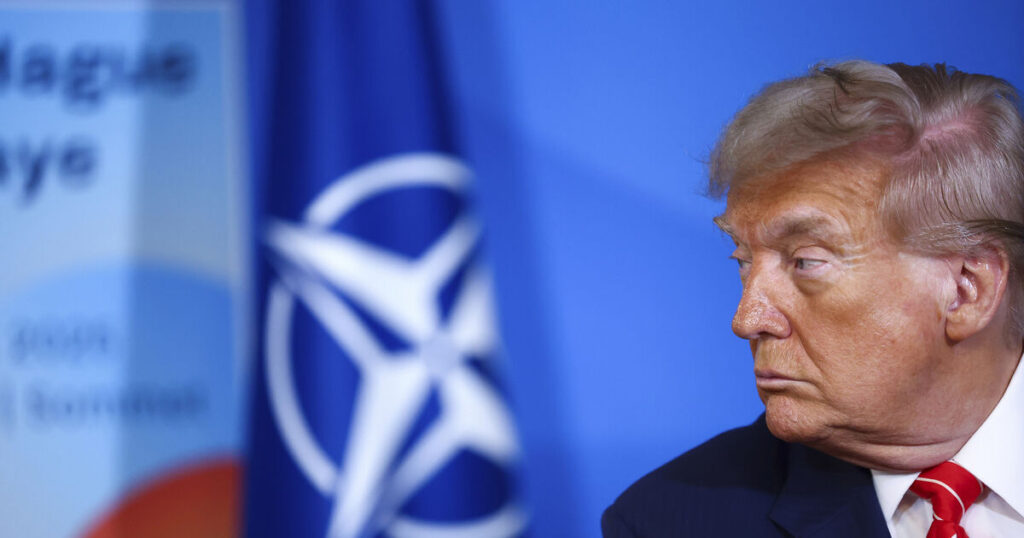US President Donald Trump has affirmed his commitment to the Nato alliance’s mutual defence guarantee as he attended its summit in the Netherlands.
Before landing in the Netherlands on Tuesday, Mr Trump cast doubt on whether the US would abide by Article 5 of the Nato treaty, which calls on all members to defend one another in case of an attack.
But on Wednesday, the US president said he stood with that promise.
“That’s why I’m here,” Mr Trump said as he met with Dick Schoof, the prime minister of the Netherlands. “Why would I be here?”
Meanwhile, the alliance on Wednesday enacted one of the Republican president’s chief priorities: a pledge by Nato member countries to increase, sometimes significantly, how much they spend on their defence.
“I’ve been asking them to go up to 5% for a number of years,” Mr Trump said earlier on Wednesday as he met with Mark Rutte, the alliance’s secretary general.
“I think that’s going to be very big news.”
The 32 leaders endorsed a final summit statement saying: “Allies commit to invest 5% of GDP annually on core defence requirements as well as defence- and security-related spending by 2035 to ensure our individual and collective obligations.”
Spain had already officially announced that it cannot meet the target, and others have voiced reservations, but the investment pledge includes a review of spending in 2029 to monitor progress and reassess the security threat posed by Russia.
The boost in spending follows years of Mr Trump’s complaints that other countries were not paying their fair share as part of an alliance created as a bulwark against threats from the former Soviet Union.
Most Nato countries, with the key exception of Spain, appeared motivated to bolster their own defences not just by Russian President Vladimir Putin’s invasion of Ukraine but also, perhaps, to placate Mr Trump.
🆕 NATO Allies have agreed to invest 5% of their GDP annually in defence.
A substantial commitment in response to significant threats to our security#NATOsummit pic.twitter.com/eFgwH3pfrR
— NATO (@NATO) June 25, 2025
As a candidate in 2016, Mr Trump suggested that as president he would not necessarily heed the alliance’s mutual defence guarantees outlined in Article 5 of the Nato treaty.
In March this year, he expressed uncertainty that Nato would come to the United States’ defence if needed, though the alliance did just that after the September 11 2001 attacks.
On Tuesday, he told reporters aboard Air Force One on his way to The Hague for the summit that whether he is committed to Article 5 “depends on your definition”.
“There’s numerous definitions of Article 5. You know that, right?” Mr Trump said.
“But I’m committed to being their friends.”
He signalled that he would give a more precise definition of what Article 5 means to him once he was at the summit.
New Hampshire senator Jeanne Shaheen, the top Democrat on the Foreign Relations Committee, who travelled to The Hague and met with several foreign leaders at the summit, said other countries raised “understandable questions” about the US commitment to the alliance, “certainly given President Trump’s past statements”.
“We were very strong and reassuring everyone that we are committed to Nato, we are committed to Article 5, we are committed to maintaining troops on the Eastern flank,” said Ms Shaheen, who represented the US Senate with Democratic senator Chris Coons of Delaware.
Mr Trump also vented to reporters before leaving Washington about the actions by Israel and Iran after his announced ceasefire – although on Monday, he said the ceasefire was “very good”.
After Mr Trump arrived in the Netherlands, news outlets, including The Associated Press, reported that a US intelligence report suggested in an early assessment that Iran’s nuclear programme had been set back only a few months by weekend strikes and was not “completely and fully obliterated”, as Mr Trump had said.
But on Wednesday morning, Mr Trump and other senior cabinet officials vigorously pushed back on the assessment, and defence secretary Pete Hegseth said the administration was launching an investigation into who disclosed those findings to reporters.
“That hit ended the war,” Mr Trump said.
Drawing comparisons to the atomic bombings from the US during the Second World War, he added: “I don’t want to use an example of Hiroshima. I don’t want to use an example of Nagasaki. But that was essentially the same thing. That ended that war.”
The White House has not said which other world leaders Mr Trump would meet with one on one while in The Hague, but the US president said during his meeting with Mr Rutte that he will meet with Ukrainian President Volodymyr Zelensky later on Wednesday.


